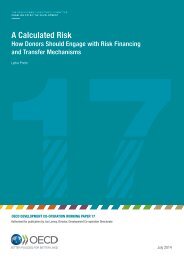UNIVERSITY
Livelihood_resilience_working_paper22
Livelihood_resilience_working_paper22
Create successful ePaper yourself
Turn your PDF publications into a flip-book with our unique Google optimized e-Paper software.
Recommendation 4: <br />
Support those who cannot migrate when places become uninhabitable due to climatic <br />
stress xlvi <br />
Environmental changes have the potential to uproot people from their land and force them to <br />
migrate. Climate-‐induced migrants have received more and more attention in the past decade, but <br />
policy discussions still lack focus on the ‘capacity to migrate.’ There is a need to support trapped <br />
populations who cannot migrate when their land and home become uninhabitable (Afifi et al. 2015). <br />
The most vulnerable people are those whose livelihoods depend on land and other natural <br />
resources, such as farmers, fishermen, and livestock herders. Vulnerable people are sometimes <br />
forced to stay in uninhabitable places, grapple with food insecurity, face economic shortages and <br />
suffer health problems. These challenges increase vulnerability by pushing people deeper into <br />
poverty and reducing their quality of life and wellbeing. <br />
Research shows that few people migrate internationally in response to climate stressors, primarily <br />
because of limited access to legal migration documents, social networks abroad and financial <br />
resources. Those whose livelihoods are directly linked to natural resources tend to move from <br />
uninhabitable places to neighbouring areas. Those who are not able to move at all, because they lack <br />
the economic and social capital to do so, are the most vulnerable (Warner & Afifi 2014). <br />
This Policy Paper calls for better incorporation of ‘migration support’ into global policy frameworks. <br />
Populations who are forced to migrate require socio-‐economic support and migration options. <br />
Global problems need global solutions, and nations receiving climate migrants need to accept their <br />
obligations and responsibilities towards climate refugees. Livelihood resilience, living opportunities <br />
and human rights protection maintained through a global support system need to be established for <br />
those who are not able to move or migrate. <br />
xlvi This recommendation was originally drafted by Andrea Rivera Sosa, Elizabeth Tellman, Nishara Fernando and Diana M. <br />
Contreras during the second Resilience Academy and subsequently edited by Sonja Ayeb-‐Karlsson, Thomas Tanner, Kees <br />
van der Geest and Koko Warner who take full responsibility for the content.



